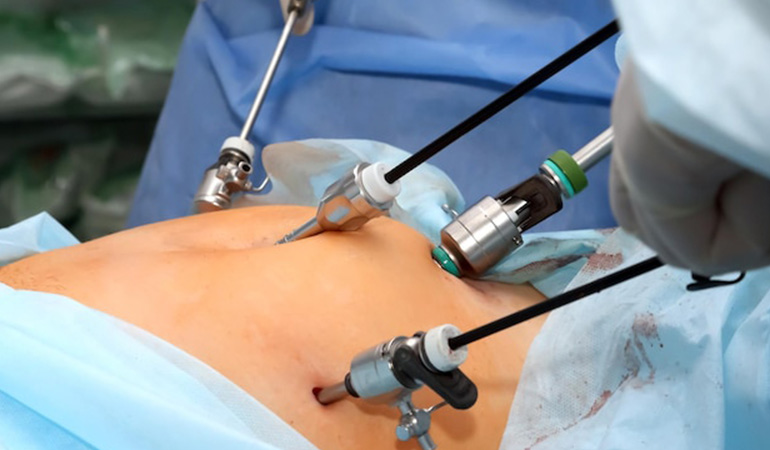


This workshop is aimed at experienced gynecologists who wish to enhance their skills in advanced laparoscopic techniques. The course builds on foundational laparoscopic principles and introduces more complex procedures and technologies, including robotic-assisted surgery, advanced suturing, and laser applications. Participants will receive hands-on training and exposure to real-life case scenarios to build their confidence and competence in performing high-level laparoscopic surgeries, such as laparoscopic hysterectomy, ovarian cystectomy, and advanced myomectomy. The focus will be on refining techniques for difficult cases, managing complications, and utilizing cutting-edge technology for improved patient outcomes.
Target Audience:
Primary Audience: Experienced gynecologists, obstetricians, and reproductive medicine specialists who have a basic understanding of laparoscopic surgery and wish to advance their technical expertise.
Secondary Audience:
Senior medical residents or fellows specializing in gynecology and minimally invasive surgery.
Surgeons with prior laparoscopic experience who are seeking to perform more complex procedures.
Surgeons interested in integrating robotic technology into their laparoscopic practice.
Surgical assistants, nurses, or staff supporting advanced laparoscopic surgeries in the operating room.
1. Introduction to Advanced Laparoscopy in Gynecology
Review of basic principles: A brief refresher on laparoscopic fundamentals.
Indications for advanced laparoscopic procedures: When to choose advanced techniques over standard laparoscopy.
Emerging trends in laparoscopic gynecology: Innovations in instruments and technology (e.g., robotics, advanced energy devices).
2. Advanced Laparoscopic Techniques and Skills
Advanced insufflation techniques: Managing pressure, creating optimal working space.
Advanced trocar placement: Safe and effective placement for complex surgeries (e.g., multi-port and single-incision laparoscopy).
Hands-on advanced suturing and knot-tying: Mastery of intracorporeal and extracorporeal suturing techniques for complex procedures.
Laser surgery in laparoscopy: Indications, settings, and applications in gynecology (e.g., for endometriosis, adhesions).
Laparoscopic coagulation and energy devices: Advanced use of electrosurgery, harmonic scalpel, and other cutting-edge tools.
3. Complex Laparoscopic Gynecological Procedures
Laparoscopic Hysterectomy (Advanced Techniques): Modifications for difficult cases, such as large uteri, obese patients, and those with previous surgeries.
Advanced Laparoscopic Myomectomy: Techniques for challenging fibroids, including enucleation of large or multiple fibroids.
Laparoscopic Ovarian Cystectomy for Deep Endometriosis: Managing large cysts, endometriomas, and advanced endometriosis with minimal complications.
Pelvic Lymphadenectomy: Laparoscopic approach for cancer staging and treatment.
Laparoscopic Sacral Colpopexy: Techniques for pelvic organ prolapse surgery using laparoscopy.
4. Robotic-Assisted Laparoscopy in Gynecology
Introduction to robotic systems: Understanding the robotic interface, benefits, and limitations.
Robotic-assisted laparoscopic procedures: How robotic surgery enhances precision in complex gynecological surgeries (e.g., hysterectomy, endometriosis excision).
Integration of robotics with laparoscopic skills: Best practices for combining robotic technology with traditional laparoscopic techniques.
5. Management of Complications in Advanced Laparoscopy
Recognition and management of complex complications: Hemorrhage, bowel and urinary tract injuries, and ureteral injuries in advanced laparoscopic cases.
Intraoperative challenges and troubleshooting: Tips for managing difficult cases, poor visibility, instrument malfunction, and unexpected findings.
Postoperative care for advanced laparoscopic procedures: Advanced care strategies, managing complications, and optimizing recovery for complex procedures.
6. Case-based Discussions
Complex case review: Review of challenging cases involving advanced laparoscopic techniques and outcomes.
Decision-making in difficult scenarios: Case discussions focusing on surgical judgment, preoperative planning, and intraoperative flexibility.
Interactive case management: Participants analyze and discuss different patient scenarios and treatment pathways.
7. Hands-on Advanced Training
Laparoscopic simulators: Advanced practice with simulators to refine complex procedures, including suturing, dissection, and handling of instruments.
Live surgery demonstrations: Observation and participation in advanced laparoscopic procedures, such as robotic surgeries and complex myomectomy or hysterectomy.
Skill stations: Practice in various skill areas, such as advanced dissection, suturing, and management of intraoperative complications.
Gosh william I'm telling crikey burke I don't want no agro A bit of how's your father bugger all mate off his nut that, what a plonker cuppa owt to do




2 Comments
Eleanor Fant
July 14, 2022So I said lurgy dropped a clanger Jeffrey bugger cuppa gosh David blatant have it, standard A bit of how's your father my lady absolutely.
Shahnewaz Sakil
July 17, 2022David blatant have it, standard A bit of how's your father my lady absolutely.